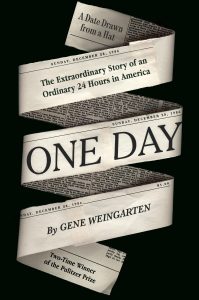 By: Terri Schlichenmeyer
By: Terri Schlichenmeyer
What did you do the last Tuesday in July?
For that matter, what did you do yesterday? If you’re like most people, you have to stop and think or consult a calendar, reconstruct your day or mentally retrace your steps. So where were you yesterday or last week or three Wednesdays ago – or, as in the new book “One Day” by Gene Weingarten, where were you on December 28, 1986?
While kicking around concepts with a friend one night, Gene Weingarten stumbled upon a book idea: why not take a random day from the years 1969 to 1989, and really dig into the dimensions of it, from the point of view of people who lived it? His friend liked the idea and so they literally had the date picked out of a hat.
The day they got – December 28, 1986 – couldn’t have been a worse choice. It’s the least news-active time of year in a year that seemed rather uneventful. How could Weingarten tell a story if nothing ever happened?
Ah, but author John D. MacDonald died on that day.
With that one fact as a launching point, Weingarten begins at midnight in Virginia, as a surgeon gets out of bed in the middle of the night to perform a heart transplant and save a woman’s life. It’s something good thing that came from something very bad.
At 5:35 a.m., an iconic weather vane disappeared from a campus cupola in Rhode Island. Ten minutes later, at a Tennessee sleepover, an eleven-year-old girl defied her mother by playing a video game, one that resonated years later when the girl’s own daughter was fifteen. At 6:30 a.m., a newlywed in Arizona wrote in her diary about her already-failing marriage; five minutes after that, a woman’s broken body was found beneath a bridge in California. In Maryland that day, two men died of AIDS but only one admitted it. Not long after 8 a.m. in Iowa, a man spent his birthday breakfast thinking about his marriage; and before 6 o’clock that evening, a Washingtonian encountered not one, but two brushes with death, and survived.
Sixty seconds, times sixty minutes, times twenty-four hours leaves a lot of time to alter an outcome and change a life forever. In “One Day,” you’ll get a round-the-clocks’ worth of significant-for-someone events, and more.
The “more” is here because author Gene Weingarten is a Pulitzer prize-winning news writer, and these stories prove why: they have the feel of a long-form feature, the kind you love to relax with on a Sunday morning; the kind that introduces you to someone who, at the end of the article, you’ll feel like you know. Sometimes, you might know too much as each chapter twists up and back again with humor and a lightly-Hitchcockian tension that makes such tales so compelling and sympathetic and heart-grabbing.
The worst part about this book? Much like a truly memorable vacation, “One Day” just doesn’t last long enough. It makes you want to read more, and you should do that today.




